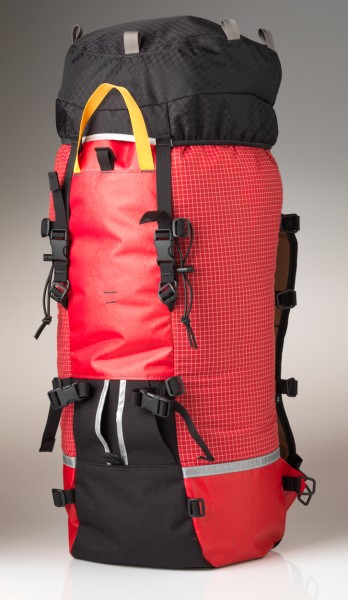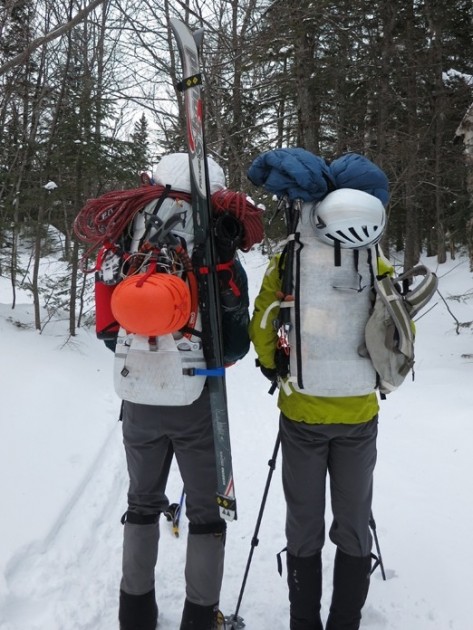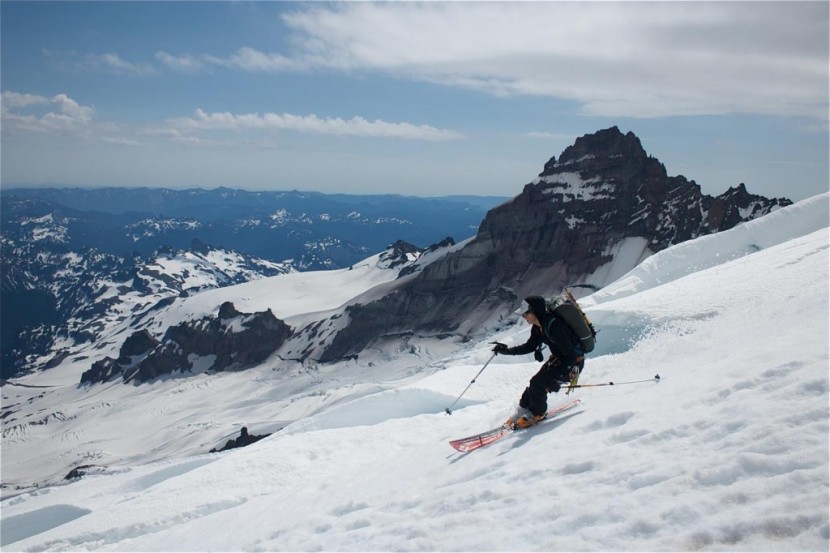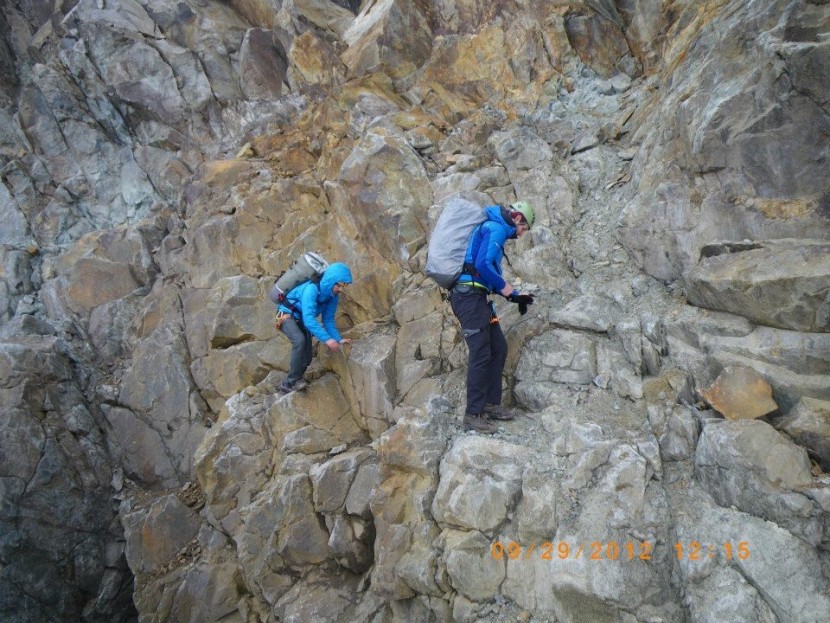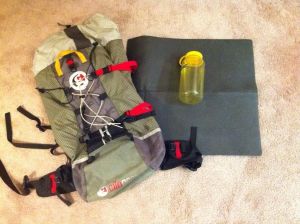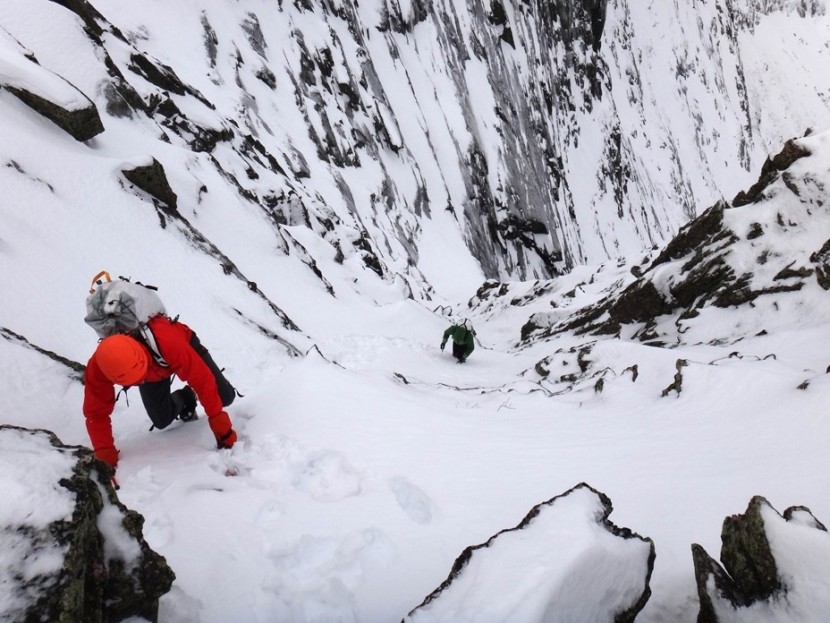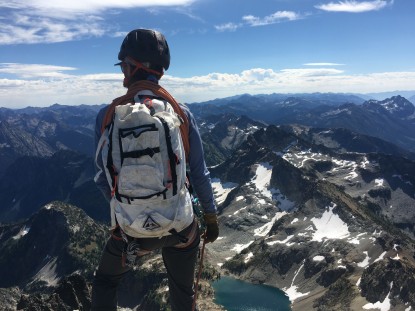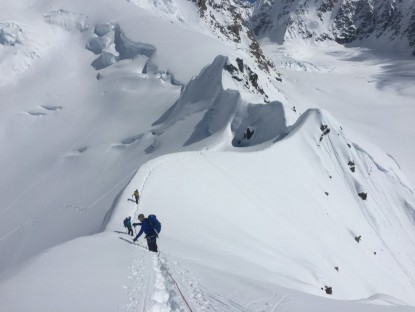CiloGear 30:30 WorkSack Review
Our Verdict
Our Analysis and Test Results
The 30:30 WorkSack comes in the following fabric options:
Standard - This is the cheapest option.Max weight - 1230g / 43.4oz
Minimum weight - 680g / 24oz
Price - $199
Guide Service - Extra durability to the bottom and sides of the pack. This is a good option for those needing superb durability but don't want to pay the high price of a dyneema pack.Max weight - 1250g / 44.1oz
Minimum weight - 700g / 24.7oz
Price - $219
Woven and Non-Woven Dyneema - (W/NWD). This is by far our favorite fabric option - extremely durable and lightweight to boot. It is likely the best pack fabric in the world. The downside? it is extremely expensive. If you want supreme durability, and don't mind paying a high price for a product that will last, the W/NWD is a good choice.Max weight - 1190g / 42oz
Minimum weight - 690g / 24.3oz
Price - $575
Performance Comparison
Weight
Like all CiloGear packs, the 30:30 allows for a lot of customization. The lid, waist belt, foam bivy pad, and all external straps are removable making the overall weight a quite changeable number. The total pack weight when “fully stripped” is 700g (24.7oz). The total pack weight when all pieces are attached is 1250g (44.1oz). This comes out to about .61 — 1.1 ounces per liter of capacity, which is quite good, especially since you're likely to use the pack at least partially stripped most of the time. In our testing we rarely used the lid (there is an internal pocket for small items), and also found a great way to rig a single strap as the waist belt (using all CiloGear included items), allowing for the removal of the padded waist belt if desired for more comfortable climbing, while still having the security of a strap around the waist.
Durability
The 30:30 Guide Service WorkSack is a step up in durability from the regular 30:30 WorkSack offered by CiloGear. In our opinion, it is worth the small increase in overall pack weight, and small increase in price, to spring for the more durable fabrics of the Guide Service version if you indeed climb often. The bottom panel of the 30:30 Guide Service - the part of the pack most subjected to abuse - is made out of VX100. This is incredibly burly 1000d Cordura laminated with Dacron X-pac, which gives more stability to the fabric and increases its rip strength. The bottom side panels of the pack, as well as the front panel (against which your crampons will likely be strapped) is VX21, the same fabric, but made with 210d Cordura. The remainder of the pack (the upper side panels, the part against your back, and the lid and made from 210d Cordura with dyneema rip-stop. Overall this design is great balance of durability (and lots of it) where needed, and lighter fabrics where durability is less of a concern. Other packs this size, like the Mountain Hardwear Summit Rocket 40, and the Hyperlite Mountain Gear Ice Pack have significantly less abrasion resistance.
Comfort
Comfort is a relative thing in alpine packs. Overall the 30:30 is reasonable comfortable for its size. By using the same suspension system as the 30L WorkSacks (a removable foam bivy pad), the 30:30 remains a low profile, light, and simple alpine climbing pack. It has less bulk, and climbs better, for example, than the 45L WorkSacks. With significantly more capacity however than the 30L WorkSacks, the 30:30 can get a bit less than comfortable when fully loaded. The longer length also makes it less comfortable to climb with than the Cilo 30L--because it doesn't ride above a harness as well-- but this is a drawback common to every 40L+ pack. Increasing volume necessitates some increase in length, which results in decreased comfort while climbing.
Like other CiloGear WorkSacks, the 30:30 features an internal compression strap, which allows you to internally compress and pull forward the load when the bag is not quite full. This is a great feature for keeping your load more securely positioned inside when climbing with a semi-empty pack. There is always a bit of a trade-off between trail comfort, on one hand, and climbing performance (how well does the pack feel while climbing) on the other. The 30:30 is a pack designed for 2-3 day trips, and for this purpose is performs very well, it encourages you to pack light. In our testing, the Hyperlite Mountain Guide Ice Pack was more comfortable to hike with (it features two removable aluminum stays), but the 30:30 climbed a bit better.
The 30:30 does not come with CiloGear's framesheet (included with the 45L WorkSacks), but is compatible with it, as well as the AirBeam framesheet. We generally use the 30:30 without a framesheet and only recommend them if you're maxing out the pack with a big, heavy load.
Versatility
Versatility is one of CiloGear's strong suits. Overall, the 30:30 is the most versatile alpine pack we've tested. There are two reasons for this. Number one — CiloGear packs are in general quite versatile. They offer a highly customizable external strap system, the ability to quickly and easily rig up a shock cord crampon attachment, removable lid, waist belt, and bivy pad etc. This allows you to rig your pack, in the configuration you wish, quickly, depending on the needs and specifics of your trip. Number two — the 40L capacity of the 30:30 is perhaps the ideal size if you're looking for one pack to do it all (or at least most of it all). Since many of us do our alpine climbing on weekends, the 1-2 night trips may be the bread and butter of your yearly alpinism. A 40L pack is a great size for this style of trip as it allows space for all the climbing supplies as well as a sleeping bag, a shelter, and a stove. Generally, 30L packs will feel quite overstuffed on a 1-2 night trip, and 45+L packs will be overkill. The 30:30 fits the bill nicely by remaining light, and simple for short trips, while offering the extra space needed for overnights.
Features
All of the features are fairly slimmed down in terms of size and weight — as the 30:30 is more akin to the 30L CiloGear WorkSack, than the 45L WorkSack. The waist belt is the same as the 30L, for example. And the lid is simple with one zippered pocket. The inside of the pack features one hanging zippered pocket, like all CiloGear WorkSacks, behind which slips the removable foam bivy pad. In our testing we highly appreciate bivy pad frames like this since they allow for an emergency pad if need be, the ability to lengthen or double up another pad you choose to bring, offer a warm/comfortable seat at camp, and can act as excellent splints in an accident.
CiloGears external strap system is highly changeable. A set-up we used often was two side straps (for a sleeping pad), no lid, and one strap on top from front to back for securing the rope. On the front panel, we rigged up a simple and easy to use (and easily replaceable) crampon attachment with a piece of shock cord and a cord lock. The ice tool attachments on all CiloGear WorkSacks are the same — reinforced fabric slits on the bottom front panel for the tool picks, which are held in place with straps and standard clips, and a shock cord loop and cord lock up top to secure the tool shaft. Simple, and very secure. This is, in our opinion the best system for ice tool / mountain axe attachment.Best Applications
Weekend alpine climbs. Trips of 1-2 nights in length (or longer if going very light).
Value
The 30:30 Guide Service come to a total of $220. This is a great deal in our opinion since you are getting a very durable, and very versatile climbing pack. There are indeed cheaper options at this capacity, but none are as well designed. The regular, non — Guide Service version is $20 cheaper. All CiloGear packs are made in Portland, OR.
Conclusion
Overall the 30:30 is a great alpine pack. Its capacity, married with the versatility and quality of its features, and its well designed durability make it our top recommendation for people looking for a mid-size pack.
How To Get It
CiloGear packs can be purchased from the CiloGear website, and at some climbing shops. Keep in mind that CiloGear is a small manufacturer and thus some delays in ordering may be encountered.


